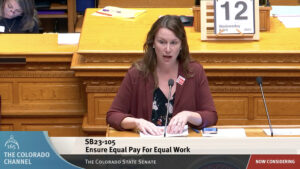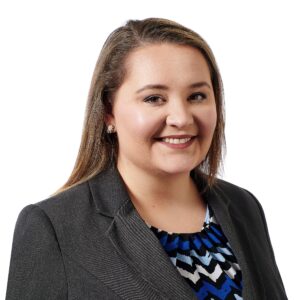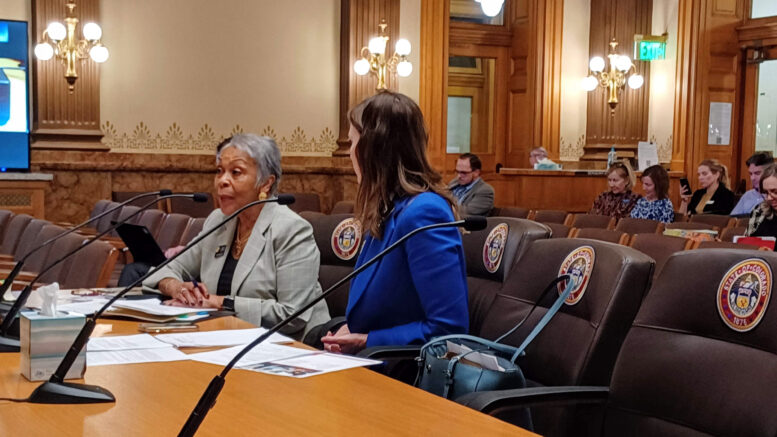Colorado regulators are working through several issues as they seek to implement an update to the state’s Equal Pay for Equal Work law — issues that are not as broad or defining as those that shaped the regulation in 2021 but that still could trip up employers if not addressed fully.
The original law took several steps to try to close the wage gap between men and women, including requiring employers to list salary ranges in job postings and banning them from asking about applicants’ previous pay levels, which could perpetuate females earning lower salaries. But it also put the Centennial State in an awkward national spotlight, as at least 100 out-of-state employers, seeking ways around its provisions, advertised that Coloradans would not be considered for the remote jobs they were seeking to fill.
Business groups, including the Colorado Chamber of Commerce, spent two years talking with sponsors of the original law about fixing the provision that led to the national blowback, seeking an exemption for employers without a physical or substantial employee presence in the state. However, in the updated law that was passed and signed this year, sponsors declined to grant such a waiver to out-of-state firms, with Sen. Jessie Danielson, D-Wheat Ridge, arguing that she wanted the same equal pay protections for remote workers as for those in an office space.

Colorado state Sen. Jessie Danielson speaks in April for her proposed update to the Equal Pay for Equal Work law.
State seeking comments on proposed rules
They did make several other updates. One very straightforward change — doubling from three to six years the amount of back pay employees can seek from employers who violated the law — irked most business groups.
Several other changes made small improvements to the law in employers’ minds, including exemptions against having to post jobs that are career progressions for some workers and a provision limiting the out-of-state jobs employers must advertise to remote Colorado workers. And it is those corrections that the Colorado Department of Labor and Employment, as well as employment attorneys, are working now to get right.
CDLE is accepting comments through Nov. 5, after which time it will lay out proposed rules to implement the updated law and then get a final rule into place by Jan. 1. The department also has more authority, beginning in 2024, to take tips and complaints and investigate alleged pay-disparity violations rather than having to rely on the court system to adjudicate all complaints.
Changes in equal pay law
The original law required that employers with any Colorado workers advertise to them any job in the company that comes open. The new law allows employers with no physical presence in Colorado and with 15 or fewer workers residing in this state to limit the jobs it advertises to its local workers to ones that can be done remotely, rather than having to inform them of, say, jobs in overseas factories.
The new law also contains a clause allowing employers to move workers up in natural career progressions — say from a Technical Worker I to a hired-paid Technical Worker II — without having to open those positions to everyone else. But it also requires that employers get information about how to get into such career progressions to “all eligible employees” without defining the term “all eligible.”
Additionally, the new law requires that employers notify others in the company about employees who are getting promotions — including workers with whom those employees will work regularly. And that, like the other provisions, has led to questions.
Questions surround changes
For example, the clause limiting required notification by out-of-state employers to those jobs that can be done remotely is slated to run through June 30, 2029, begging the question of what happens after then, said Dan Block, a shareholder with Robinson Waters & O’Dorisio, P.C. If it then requires these employers to let Colorado workers know of any job opening in the world, it creates some of the same problems as the wide scope of the original law, he posited.

Grace McGuire is a special counsel with Littler.
Grace McGuire, a special counsel with Littler who is focused on employment issues, said the general wording of the new law leaves questions about how far it will be applied in terms of geographic requirements. Will a Massachusetts company have to inform Colorado employees of career progressions, internal promotions and other personnel moves that don’t have a connection to Colorado? And could that affect their willingness to hire workers in Colorado?
“The problem comes when the Legislature doesn’t define who this law applies to,” McGuire told The Sum & Substance. “As with the current law, the new law doesn’t define how you limit this to Colorado-specific operations.”
A smattering of issues
Attendees at an Aug. 22 CDLE pre-rulemaking hearing picked out several other provisions that could serve as speed bumps to employers.
McGuire, for example, asked whether employers must send out notices of every promotion and hiring individually to comply with the law or whether they could include them in monthly email blasts to avoid overburdening human-relations directors and deluging workers with notices.
Christina Cecil, chief human resources officer for the Colorado Community College System, asked if CDLE could expand a six-month allowance in the new law for employers to appoint people to temporary promotions without having to go through the hiring process. Colleges might have to make appointments during an academic year to see a department through and typically wouldn’t start the permanent hiring process until the end of that year, which could be another nine months away, Cecil noted.
Stacey Campbell of Campbell Litigation questioned whether CDLE would look askew at employers if they put a significant number of workers on career-progression paths that don’t require going through the hiring process for each position on that path.

Stacey Campbell is a shareholder with Campbell Litigation.
What happens next with equal pay update
Scott Moss, director of CDLE’s division of labor standards and statistics, largely listened rather than answering questions at the August hearing, saying that the division is considering all the input as it draws up proposed final rules. He thanked Campbell for flagging the issue of numerous career-progression tracts, however, and told McGuire that there is no intention right now to define which employees are eligible to learn about such progression paths.
Moss and employment attorneys agree that the questions CDLE must deal with in drawing up rules for what are far fewer than those involved with the original 2019 bill, which went into effect at the beginning of 2021. In that case, Moss noted, there was only one sentence each on pay transparency and promotional transparency, and the division had to interpret exactly what regulations would be needed to meet those broad goals.
Senate Bill 23-105 was a lot more specific about what must be done, but the questions that hang over it must be answered so that employers can know the exact steps they have to take to comply, both Block and McGuire said.
“I think that while the Legislature has done some good work trying to narrow the unexpected burdens of the original law, there are still aspects of the regulations that employers find overly burdensome,” McGuire said. “Certainly, they are one-of-a-kind regulations, especially the promotions piece, and I think employers will still think about wanting to expand into Colorado.”
